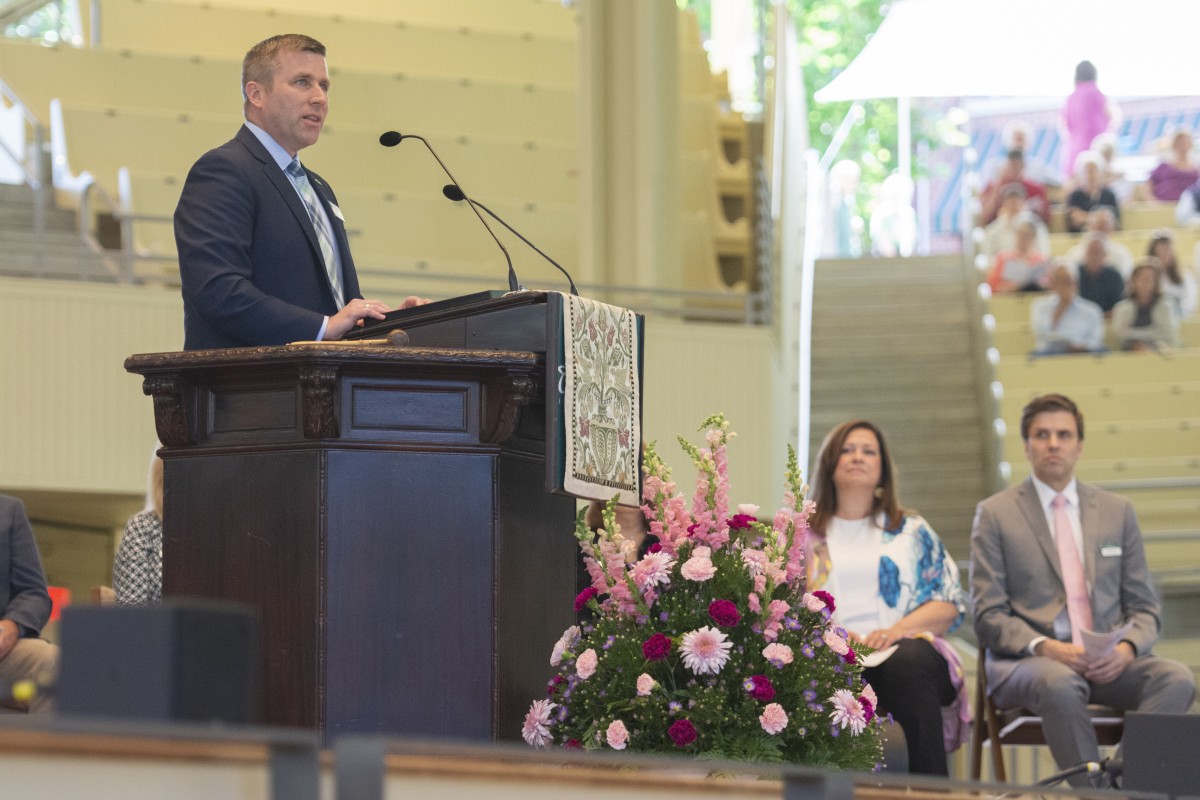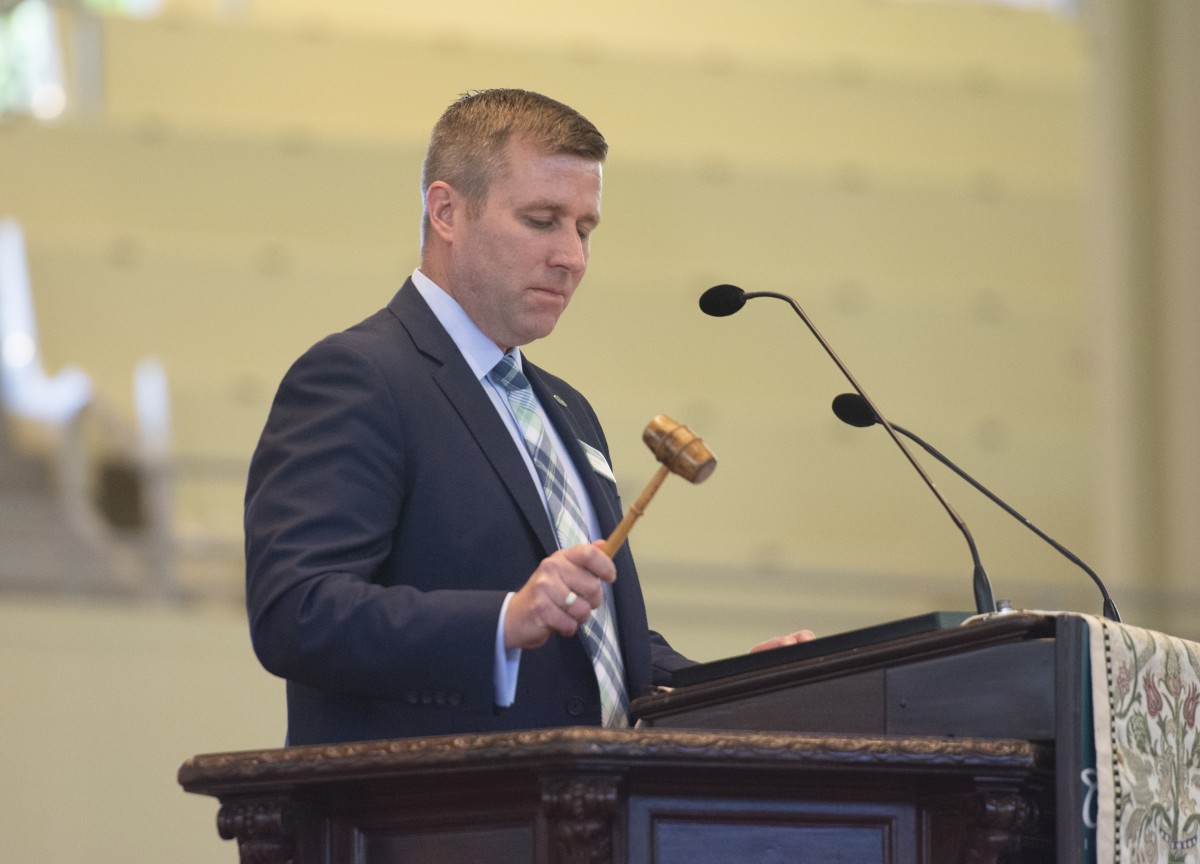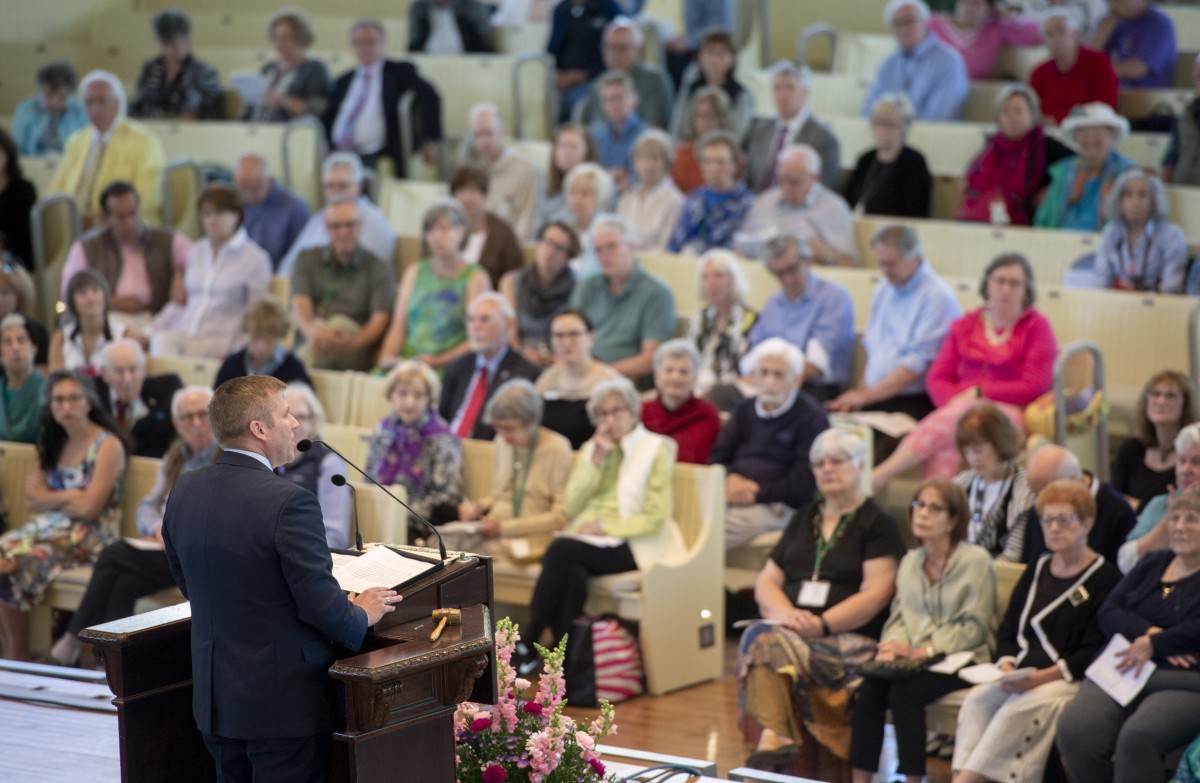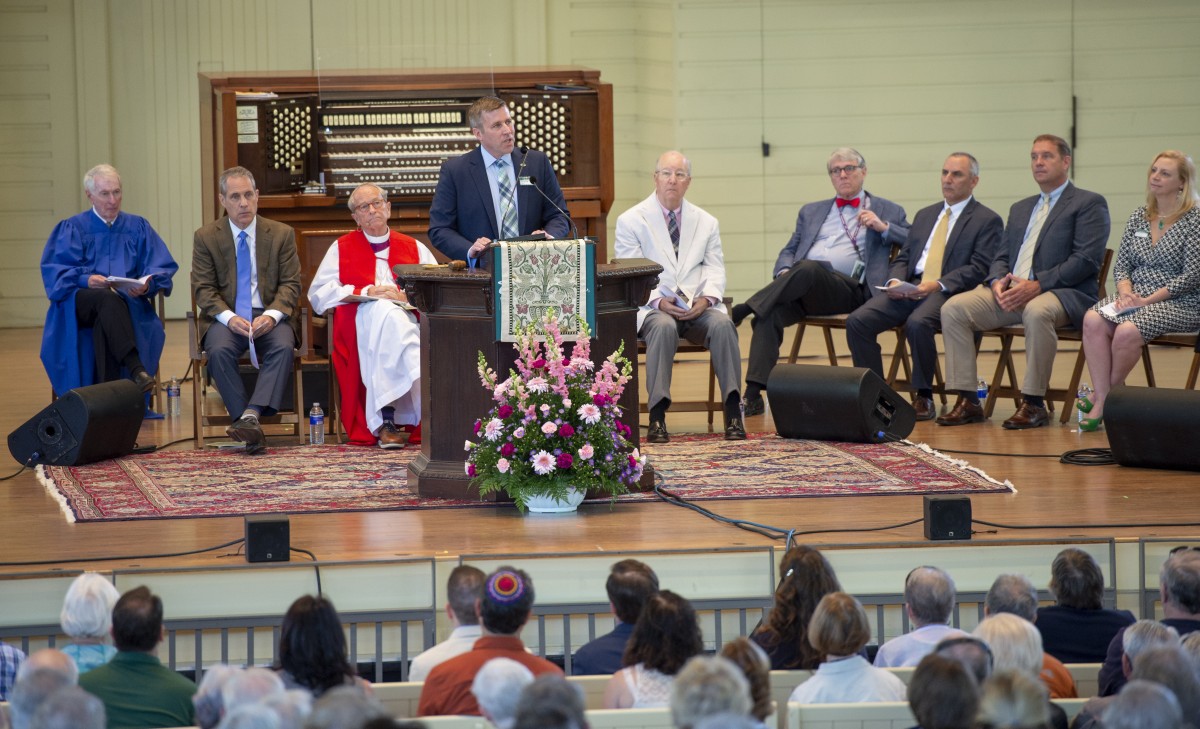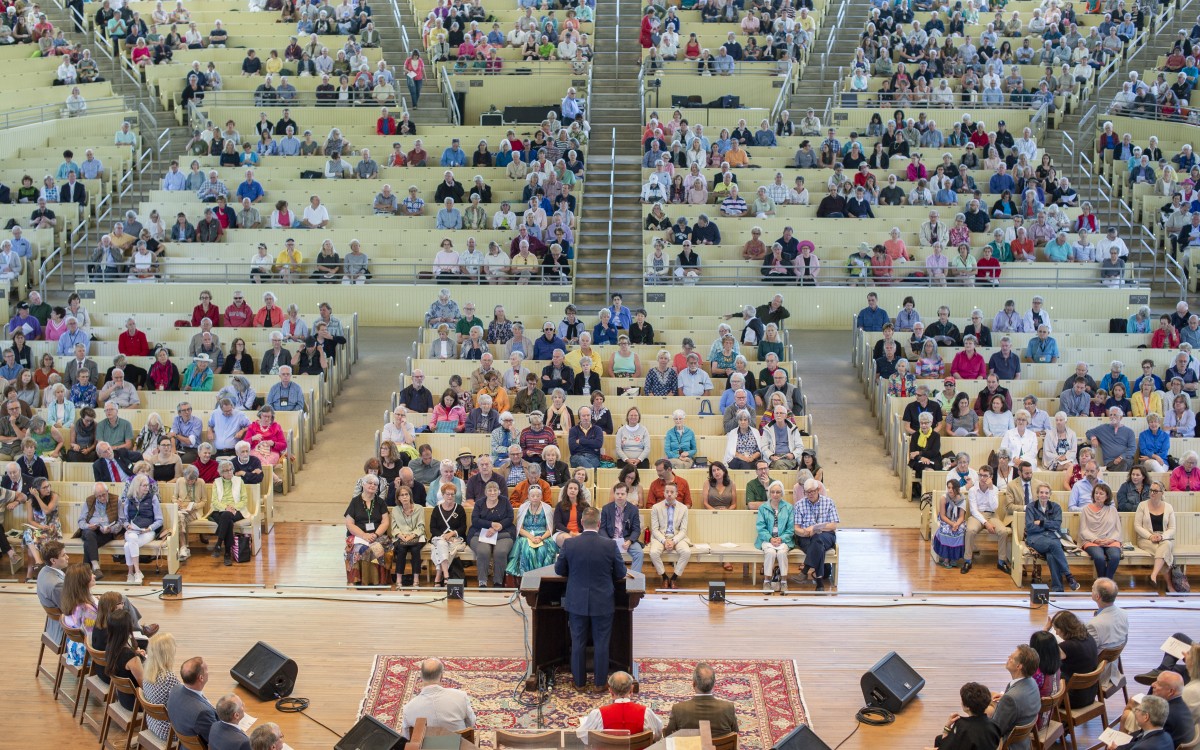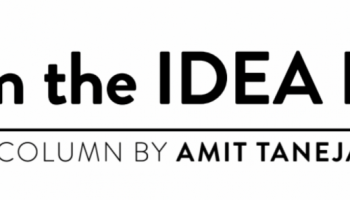Good morning. As president of the Institution, it is my special privilege to welcome you to Chautauqua’s 146th Assembly. Whether this is your first day at Chautauqua or you count your attendance in decades and generations, know you are welcome in this sacred space and that no matter how long you are with us, we hope you will consider this your home. We welcome you.
I also greet you this morning with gratitude for those assembled on the stage with me, our board of trustees and the Institution’s executive team. You will find no greater example of servant leadership than these fine folks, and they have my gratitude for all they do for the mission of Chautauqua.
On a deeply personal note, this is the first time that my mom has been able to be with us for Three Taps of the Gavel, although she has been to Chautauqua many times. I once asked a theater of 300 people to sing happy birthday to her. I assure you, she is equally mortified today. You’re welcome, Mom.
It’s been a long winter without you, as it always is, but it makes your homecoming all the sweeter.
While my colleagues and I deeply enjoy the “off-season” work of curating each week’s lectures, performances, classes and community events, we also relish the opportunity to live into the themes with you; to experience the high and higher points of the conversations we have envisioned; and to grow with you as engaged citizens attempting to unravel the complex, unite the disconnected, and marvel at the extraordinary.
We also launch this assembly with two very important milestone anniversaries to celebrate: the 90th anniversary seasons of the Chautauqua Symphony Orchestra and Chautauqua Opera Company.
Both the CSO and Chautauqua Opera have special experiences in store for us, and if you have not before counted yourself as a symphony or opera aficionado, this is your year to take the plunge. As the moniker above the stage in Norton Hall, the home of our opera, reads: “All passes. Art Alone Endures.” I hope you’ll participate in the enduring stories these two artistic ensembles will share.
And please allow me to brag about two more items from the work of our artists. Recently we learned that a work that Chautauqua Theater Company had as part of its 2017 New Play Workshop, Birthday Candles, will be headed to Broadway this year, will star Debra Messing of “Will & Grace” fame, and will be directed by none other than our former CTC Artistic Director Vivienne Benesch. Viv is uniquely responsible for fulfilling a long dream we’ve had of our work going on to Broadway, and we thank her and our incredible company of artists under the direction of Andrew Borba for making that a reality.
And just this week, we learned that one of this year’s CLSC authors, Joy Harjo, has been named the Poet Laureate of the United States — the first Native American to hold that post.
Our artists so often light the way for the great conversations we have here, and we’re just incredibly proud of all of their accomplishments.
The “off-season” this year has been quite a bit different from those of previous years. In fact, the term “off-season” is becoming less and less relevant, as we have begun to redefine Chautauqua as a place and a mission for all seasons. This year’s assembly marks the beginning of a new vision for the Institution that has us pursuing a bold path to an even more exciting future.
Over the past 18 months, we have progressed through a process that resulted in the board of trustees’ approval of our new strategic plan, titled 150 Forward. We make our plan public today online, and we are eager to host discussions every Thursday at 3:30 p.m. in the Hall of Christ to engage with you about its components and how they will guide decisions, actions and investments over the next decade.
While we will review the plan’s vision, goal, values, objectives and imperatives in some detail during our weekly meetings, today I want to launch this season by sharing what 150 Forward calls Chautauqua to do and be here on our sacred grounds and in the world.
And the picture I’d like to paint for you is one of walking a tightrope. When one walks a tightrope, one has to be careful not to lean too far in either direction. The key is to build the right muscles to walk that tightrope effectively, so one doesn’t take steps in fear of falling but rather takes them gracefully, with courage, confidence and informed conviction.
Fear not: We are not going to ask you to engage in “circus boot camp” this summer. Ours is not a literal tightrope, but rather a tightrope between history and innovation.
Since the first day of my presidency at Chautauqua, I’ve known that success means not only paying attention to the realities of the day but also listening intently for the cues from those who have come before. I’ve wondered and pondered what our founders Lewis Miller and John Heyl Vincent would share with me as we prepare for Chautauqua’s 150th birthday and beyond. And while I don’t have the benefit of their real-time counsel, after 18 months of listening and learning from those who can trace their own lineage to our founding, and from those who had a timeless affinity for Chautauqua after only one day on the grounds, I think they’d approve.
At its heart, 150 Forward has one over-arching goal: “To convene diverse perspectives and voices to discover and advance the most important, relevant conversations and experiences of our time during the summer assembly season and year-round, on the grounds of the institution and beyond.”
It’s grammatically correct, but — I’ll give it to you — that’s a long sentence. So, let’s pull it apart together to more effectively examine its meaning and intent.
The first part of our goal calls us to convene diverse perspectives and voices to discover and advance the most important, relevant conversations and experiences of our time.
You wouldn’t expect Chautauqua to shoot for anything less than the stars as we envision a 10-year goal, and we haven’t. But why this goal at this time?
The goal itself is not new. A reading of our history would tell you that Miller and Vincent founded Chautauqua to assemble people who wanted to make a difference in the world and prepared a meal of the issues most pressing in the society of their time. Those early Chautauquans pondered the important questions of their day and were asked to go back to their home communities to make a difference.
Our prescription is not all that different, but our world is asking us to probe different questions and needs us to provide solutions for an era of divisiveness, derision and, some might say, delusion. There is a mission imperative for us not to lock ourselves behind our privileged gates, but rather to craft new gateways of understanding and of civil dialogue. Chautauqua has always asked the most important questions of the day, and during a few very special times in its history, has understood that it has a unique role in providing the answers.
We have been called for such a time as this, and we intend to seize that charge.
But how will we know when we’ve achieved that aspiration?
We’ll know we’ve made headway in the work of advancing the most important, relevant conversations of our time when Chautauqua’s name becomes synonymous with civil dialogue in communities across the nation; when what we have long achieved here over the summer ripples forth throughout the year and to the places where it’s needed most.
We’ll know we’ve succeeded when our name is no longer hard to spell or to explain, but rather stands as a symbol of what’s possible when people of good will decide that “enough is enough,” that there is indeed a better way.
We’ll know we’ve made it when the summer assembly season — the purest manifestation of our mission — exemplifies the very best of what Chautauqua and Chautauquans can achieve.
By the mid-point of this plan’s life, when Chautauqua turns 150 years old, we envision an increasing number of national and international-level partners seeking — maybe even competing — for a place on the Summer Assembly agenda. And, they will bring to our stages not only highly-sought-after speakers, preachers and performances, but also relationships that significantly widen our circles of impact.
Conversations that start during our assembly will be just the beginning.
By the end of the life of this plan in 2028, we will enjoy Chautauqua Lake as a thriving freshwater ecosystem that is well on its way to becoming healthy by a number of standards — among New York State’s best examples of lake conservation, negative ecological trend reversal, and community collaboration. This is something we certainly can’t do alone, but that we hope can stand as a successful example of what we will explore during Week Two, framed by the theme: “Communities Working Toward Solutions.”
And, by the time we convene Chautauqua’s 156th Assembly, the Institution will be lauded not only as an organization steeped in history but also a community that prioritizes inclusion, diversity, equity, and accessibility, and the Institution’s strategies for broadening its circle of engagement will be heralded as a new model for diversity transformation.
And the work of embracing difference that so many Chautauquans have been committed to for a lifetime will find new depth and breadth starting this summer. As one of our newly articulated values indicates, at Chautauqua, we value the contributions and dignity of all people.
I’d like to pause here for a moment, because this is so important to who we are and who we have aspired to be our entire history. I have been president of Chautauqua for three seasons now, and in each of these seasons, there has been at least one major incident that reminds us that we sometimes struggle to embrace difference.
I have sat with those who have been targeted.
I have held the hands of those who felt afflicted.
I’ve looked at too many faces of those who have experienced cyberbullying or received an anonymous letter whose author feels free to spew hatred but lacks the courage or conviction to sign their name or claim their vitriol.
And when those who simply want to engage in the life of this community as anyone else does ask me why they have been singled out, I admit I have no answer.
Today I tell you that I still don’t completely understand why hate shows up here, in this place that has been dedicated to the opposite of hate for nearly 150 years. But I do not need to figure that out before I can say, clearly and without hesitation, that when hate comes here, it must get no oxygen. It must be starved by the dignity and conviction of our community.
We will continue to wrestle with this — as will the nation in general — but with the affirmed value of honoring the “contributions and dignity of all people,” we simply must universally declare and hold one another accountable to a bright line in the sand and that line is this: Hatred and bigotry will not find a home at Chautauqua.
We uniquely have the opportunity to embrace this as an entire community to demonstrate to the world that not all places operate from the premise of deciding who’s in and who’s out.
We have the opportunity to model that differences in opinion or ideology can be discussed with the goal of seeking understanding versus simply claiming victory for shouting the loudest. Whether we call that civil dialogue or simply living into the best of our human values, the values in 150 Forward call Chautauqua and Chautauquans to aspire to be the exception to the rule so we can, together, fully realize our mission.
I know that I am speaking of a small fraction.
I know that the values in the strategic plan are the values of almost everyone here, because they came from you. This plan consists of your words and your hopes and your dreams. These are our values and when someone comes to this place and tries to fracture those values, we are called to say “no.”
So many of you have asked me in the past three years what you can do to help us advance this vision of a Chautauqua where all are welcome. And there actually is an answer to the question. As we start our summer together, I invite you to join me in rejecting any sign of closed-mindedness, prejudice or bigotry on our grounds and to embrace a proactive and intentional culture of inclusivity, including when your own beliefs are challenged. It is simply not enough to invite people here or to tolerate their presence. We must embrace and welcome and seek to understand — these are our shared Chautauqua values.
Thanks for giving me a moment to highlight this important work, and it also flows naturally into the next part of our overarching goal statement, which calls us to take Chautauqua’s mission beyond the gates and the Summer Assembly Season in greater earnest.
But what might that look like?
We see our grounds as a magnet for programming and activities well beyond the summer months, as we transform what is currently parking lot and maintenance building space across Route 394 into an enterprise zone that has attracted mission-aligned businesses and provides an additional year-round location to amplify our presence, create new forms of revenue and provide an additional physical home for our mission.
And, we’ll know we’ve reached the apex of that aspiration when the Institution’s increased programming and activity on the grounds outside of the summer assembly season leads to more life-sustaining, full-time jobs in Chautauqua County while also contributing to regional economic development through expanded tourism and business growth.
We envision bold new partnerships with like-minded national thought leaders and organizations, taking the brand of Chautauqua across the nation through digital engagement, by sharing in communities and through media partnerships that allow our light — too long hidden under a bushel basket — to shine with the hope and aspiration we’ve come to expect here every summer.
Our expanded work in the world will be rewarded through transformational growth in private philanthropy, complemented by investments from regional and national foundations and corporate support, that speaks to our impact in the world.
President Kennedy’s singular focus for NASA was to put a man on the moon. He was relentless in the pursuit, and he and so many others refused to deem it impossible. Management scientists suggest one of the keys to President Kennedy’s success was his ability to motivate and focus every person on the NASA team on the “Man on the Moon” vision, so much so that if you asked a NASA custodian about his or her job, the response would be: “I’m not mopping the floors, I’m putting a man on the moon.”
This is precisely the question we asked our community to ponder last summer – What is the ultimate meaning of this assembly and what do you wish for it to be or become? You told us awe-inspiring things when you said:
We are creating ways for people to have meaningful, impactful conversations.
We are transforming discord into discourse.
We’re imagining solutions to some of the world’s most challenging problem.
We’re helping people make a difference in their communities.
We are recalling the very foundations of our democracy.
Mr. Miller deeply loved the grounds of the unfolding Chautauqua. He saw the power in the place, and he soaked in the scholarly pursuit that occurred each summer as a way to catch a glimpse of the divine. It was a love affair and an inheritance that continues to this day for all lucky enough to call themselves Chautauquans.
Bishop Vincent was a restless soul who saw the advent of Chautauqua as the beginning of a movement, the possibility of a nationwide conversation of renewal and promise. He saw the power in the idea, and it spawned dreams that were realized far from our shores during important moments in the life of our nation.
Our time calls us to walk the tightrope between those two dreams: to harness the power of place to model what we most hope for communities across humanity while acknowledging that the idea — the movement — cannot be contained by geography.
And here’s the great magic of this:
I didn’t create it.
This is what you told us was ours to do.
Now, my dear friends, grab the balancing pole and walk with me.

